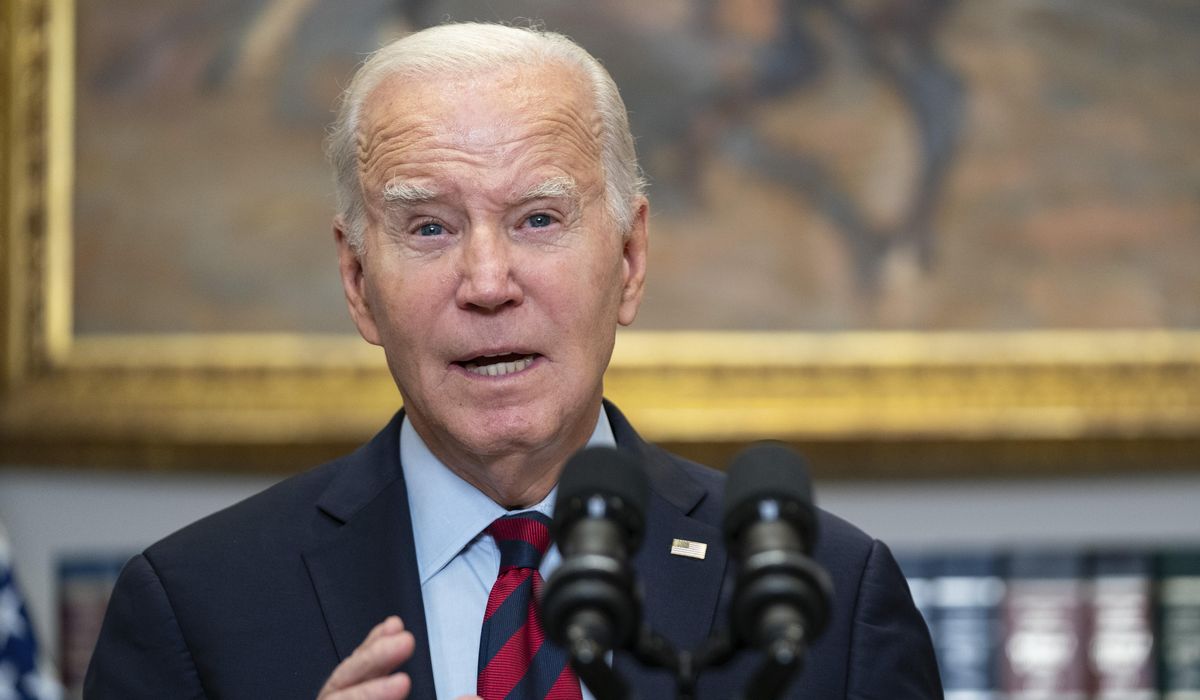


A boycott against repaying student loans has emerged around President Biden’s efforts, largely unappreciated by his base, to erase the debt for millions of borrowers.
Since the federal government stopped a three-year “pandemic pause” on student loan repayments last October, only 40% of borrowers have paid all their monthly obligations, while 35% have made some payments and 25% haven’t made any, an Intelligent.com survey found.
One in 10 student loan borrowers said they have been skipping their payments intentionally as a boycott to pressure Mr. Biden to cancel more debt, the survey found. Dissatisfaction among Democratic voters who believe Mr. Biden hasn’t kept his promise to erase student debt is another reelection challenge for the president.
While the boycotting borrowers think their efforts may lead to change, financial experts say otherwise.
“Although the frustration behind the student loan boycott is understandable, it’s unlikely to lead to positive change,” said Jake Hill, founder and CEO of DebtHammer. “Instead, it will destroy credit scores of those who choose to participate.”
Mr. Hill said hurting your credit score “may not seem like a major issue in the short term, but failing to pay your student loans makes it more difficult to obtain funding for future purchases.”
“For example, if you default on your student loans, you’ll be unable to obtain most mortgages, which will derail any plans you have to purchase a home,” he told Intelligent.com.
More than 43 million borrowers owe a collective $1.63 trillion in student loans. Among those surveyed, 18% of borrowers said they were waiting until September to make payments because it’s the administration’s deadline for more severe consequences for missing payments to begin.
Elaine Parker, president of the conservative advocacy group Job Creators Network Foundation, said the borrowers are “throwing a temper tantrum about having to repay their loans after a three-and-a-half year payment holiday.”
She said Mr. Biden is largely responsible for the borrowers’ “bad decisions because he has continually given them false hope that their loans will eventually be canceled.”
“Many borrowers hope their turn will be next, but they risk financial ruin by taking this gamble,” Ms. Parker said. “Rather than demanding that taxpayers forgive their loans, students should protest their colleges for saddling them with these debts in the first place.”
She noted the increased tuition prices over the last decade and said the schools should be held accountable for their role in the student loan crisis.
Last June, the Supreme Court struck down Mr. Biden’s program that was set to erase roughly $430 billion in student loan debt. Since then, the president has been implementing smaller, more targeted programs that the White House says canceled $132 billion in debt.
One program — Saving on a Valuable Education – allows borrowers who took out less than $12,000 in loans and have been paying them back for at least 10 years to erase their debt. At the start of January, about 6.9 million borrowers had enrolled in the plan, and those who qualify will have their debt canceled in February.
But even some of the president’s staunchest allies are concerned that Mr. Biden and his reelection team are not getting the debt-forgiveness message to voters.
“Nobody writes about that. Nobody talks about that,” Rep. James E. Clyburn, South Carolina Democrat, said earlier this month on CNN. “I’m still hearing from people … that he did not keep his promise on student loan debt relief. And he has.”
The idea of boycotting repayment started before borrowers even had to start paying. In an August survey, 49% of borrowers said they were aware of calls for a repayment boycott when the pause was set to end. More than half of borrowers, 62%, said they were “highly likely” or “somewhat likely” to join in.
Out of those currently boycotting, 44% believe their protest will lead to the cancellation of some of the debt, while 28% think the boycotting will get the government to cancel all of the debt.
A whopping 86% said the boycott efforts will bring attention to the student loan debt conversation, and 64% said the boycott will pave the way for more elected officials who believe in loan forgiveness.
But, the survey also found that seven in 10 borrowers who haven’t resumed payments said it’s because they can’t afford them, and 94% said it’s been financially challenging for them since resuming the payments.
There are options for those struggling, said Eric Eng, founder and CEO of AdmissionsSight.
“Borrowers grappling with student loan repayments should explore income-driven plans, loan forgiveness programs, and loan consolidation as possible strategies for managing their debts,” Mr. Eng said. “Income-driven repayment plans, which align monthly payments with income level, might provide a more feasible payment amount.”
Of the 41% of borrowers who are aware of the income-based repayment plans, 29% have enrolled, and 15% have applied and are waiting for a response.
The Intelligent.com survey was conducted online on Jan. 5 with 1,000 respondents.
• Mallory Wilson can be reached at mwilson@washingtontimes.com.
